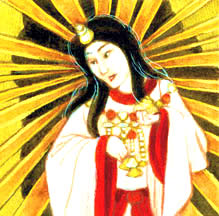 Honoured Miss Veronika writes:
Honoured Miss Veronika writes:
In your wonderful essay on The Three Werdes you say "...These words are related to the Latin root sol, which gives us "solar" and (with the standard l-to-r transposition) to the ancient Indo-European Solar deity Surya/Syria."
Syria is "the Country of the Sun" and its capital, known as Heliopolis (Sun-City) to the Greeks, was the original Heliopolis; according to Guenon, pre dating the Egyptian one. The Aristasian Sun-City is Rayapurh.
What fascinates me is that Sai Raya, the Aristasian Sun Goddess has a name structurally identical to Syria and the ancient Indo-European sun-Deity Surya if the name is taken together with the honorific.
I am a little puzzled. Would the learned and honourable votaries of this Chapel care to comment?
The name Raya is connected to a huge group with the root *
reg, meaning to set straight, rule or guide. It is the root of countless words: right rule, reign, royal, Sanskrit
raj, German
reich Latin
rect and
regulus (correct, erect regular, regulate etc.) as well as the straight
rays of the sun.
However, while this is the Tellurian "etymology" of what is essentially a non-Tellurian word, it is clear that Sai Raya, taken together (and Sai Raya is the only Janya whose name is
never used without the honorific), reproduces the ancient structure of Surya/Syria.
We must understand here that language is a deep and living thing connected organically to the underlying structure of being and that these Aristasian words have a fascinating power and depth.
Another interesting example is the name of
Sai Thame. While immediately it may seem clearly to be akin to Greek Themis, the equivalent classical Goddess, the name is also strikingly close to Sanskrit
dharma (Pali
dhamma), which expresses in Tellurian terms the precise concept of (small t) thame.
 Honoured Miss Veronika writes:
Honoured Miss Veronika writes:



